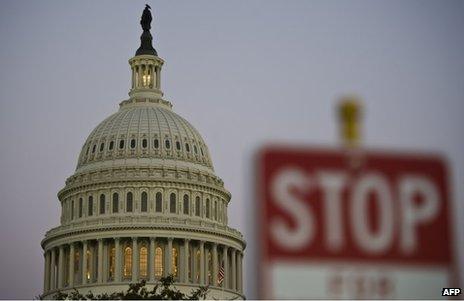Onset of the storm
- Published
- comments

So the American government is in the process of shutting down. Yikes, presumably.
Except that as I write, shares are up a bit in Japan and only modestly lower in Hong Kong (well 1.5% down).
Why the muted reaction?
It is partly because there has been news seen as positive by investors from Tokyo (a twin track policy to raise more revenue from a sales tax, as a gesture to make a dent in Japan's egregiously huge national debt, and a capital spending stimulus).
And it is partly because the economic impact of putting 800,000 US public sector workers on unpaid leave and asking another one million to work for nothing will be gradual and incremental.
If, miraculously, Democrats and Tea Party Republicans reach an entente on the budget within a day or two, the negative effect on the recovery of the US economy will be fairly limited (IHS estimates that the daily cost in lost output will be just $300m - trivial for an economy whose annual output is 52,000 times greater).
But, over time, all those gobbets of lost production would add up. And if the hiatus in government doing its normal business were to last about three weeks or so, as long as the last such snafu 17 years ago, US growth for the last three months of the year could halve - from a forecast of just over 2% (on an annualised basis) to nearer 1%.
Which would not be a disaster. But don't forget that for all the talk of the rise and rise of China, the US remains the biggest and most important economy in the world.
And, for all the recent volatility in markets caused by uncertainties over whether the US Federal Reserve would scale back its massive and unprecedented creation of cheap money, it was the recent revival of confidence in and about US prospects that has created an altogether better mood about global economic prospects.
Also, an even longer shutdown could lead to a proportionately greater losses of output:
workers, unsure when they are going to be paid, would spend less and less
the impact on tourism would magnify
there would be costs to the transport and travel industries of it becoming impossible to renew passports and driving licences, inter alia
As it happens, the fortunes of the US are particularly important to the UK. It is no coincidence that the British economic recovery has been on the coat tails of a reviving US, because America is the UK's single biggest export market, and one of the few important markets where we generate a current account surplus.
So a dampened US economy probably means a dampened British economy.
However none of this really matters a bean compared with the big looming storm cloud, which is that the US Federal government will run out of money in a few weeks, unless the GOP and President Obama patch up their differences and Congress votes to allow the government to borrow more than its current $16.7 trillion so-called debt ceiling (see The gathering storm? for more on this).
What does that mean?

If the shutdown continues, mortgage borrowers in the UK may start to notice
Well, the government of the world's richest country won't be able to pay its bills as they fall due. Which is a bizarre, incredible idea. But given that the Tea Party and Democrats are divided by fiscal religion, it could just happen.
Here is what is scary about that prospect.
If the US government were to fail to repay one of its bonds as it fell due, or not pay interest on some of them, that would not mean that all US Treasury bonds were in default (in the jargon, there are no cross default clauses). But it would mean that the perceived quality of all the trillions of dollars of bonds it has sold would deteriorate (here is one of my "dear grandma, love egg" moments - when a government issues a bond, it is borrowing from investors).
That would lead to a fall in the price of those bonds. And, to remind you (sorry), when bond prices fall, the yield on them rises - which matters to all of us, because the yield on US Treasury bonds is the benchmark interest rate for all of us, so a fall in the price of US government bonds would lead to higher borrowing costs for more or less everyone.
This means you, if you are a mortgage borrower in Skegness, for example, or a business in Rio. And you don't need telling that a rise in the global cost of money would not necessarily be ideal at a time when we are only just beginning to climb out of the economic slough of despond into which we were rudely thrown five years ago.
And there is another thing.
Apparently, according to RBC capital markets, it will be impossible to actually know for possibly a day or so after Washington has failed to pay interest on a bond or bonds whether the default has happened and which bonds are in default (see the FT's Alphaville, external).

And the ripples will continue to spread
That would take us back to the nerve-wracking uncertainty of 2007 and 2008, when investors shunned whole classes of securities and indiscriminately boycotted big financial systems, because they couldn't see which were sound and which bust.
The point is that US Treasuries are the collateral of choice underpinning more credit creation than any other class of financial product. And if all treasuries were tainted by the impossibility of knowing which were actually in default, well a spanner the size of an asteroid would be inserted into the global system for manufacturing loans.
Scary? Yes.
So scary that Congress will never allow it to happen?
Presumably - though the longer the uncertainty persists, the more that investors will fear that the worst could just possibly happen, and that in itself could increase the price of money.
UPDATE 11:55
It is official: I am an idiot.
The Hong Kong stock market was closed today, so the fall in shares there to which I referred earlier happened yesterday, in anticipation of the partial shut down of the American government.
But my point still holds: markets are thumbing their noses at the breakdown of decision-making in Washington; European shares are up (a bit) this morning.
And another thing. Everyone (I mean everyone) tells me that the US will never default on its debt and interest payments, that they would direct whatever tax revenues are coming in to service what is due on Treasury Bonds.
Which implies that the default would be on payments to stationery suppliers, or defence contractors or civil servants.
Whoop de do, as they say. I am not sure that is so much better than keeping bondholders whole.
An inability to pay what it owes would not exactly do wonders for the credit standing of the world's most powerful government. And, pending agreement on a new budget and debt ceiling, there might be implications for the credit ratings of US official debt and US banks (whose own credit ratings are too intimately linked to the ratings of the governments which stand behind them).
An across-the-board downgrade of US official and quasi official debts - the debt that rules the world - would precipitate unthinkable turmoil in markets.
So, of course, it won't be allowed to happen (I suppose).